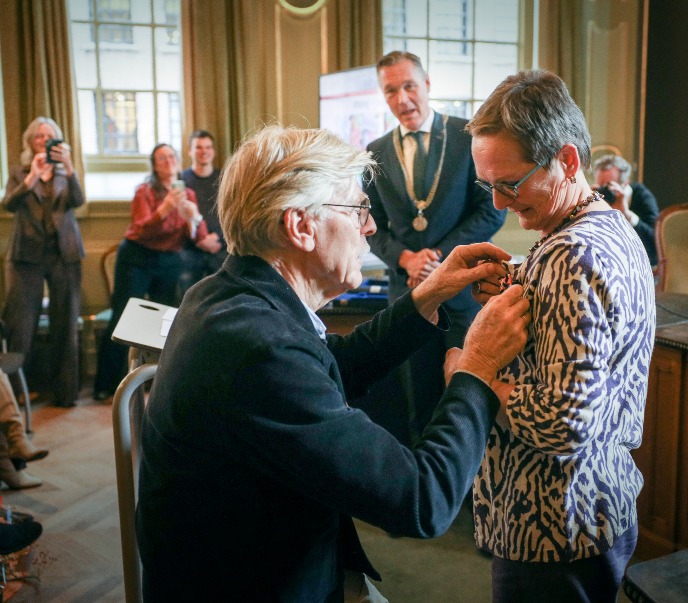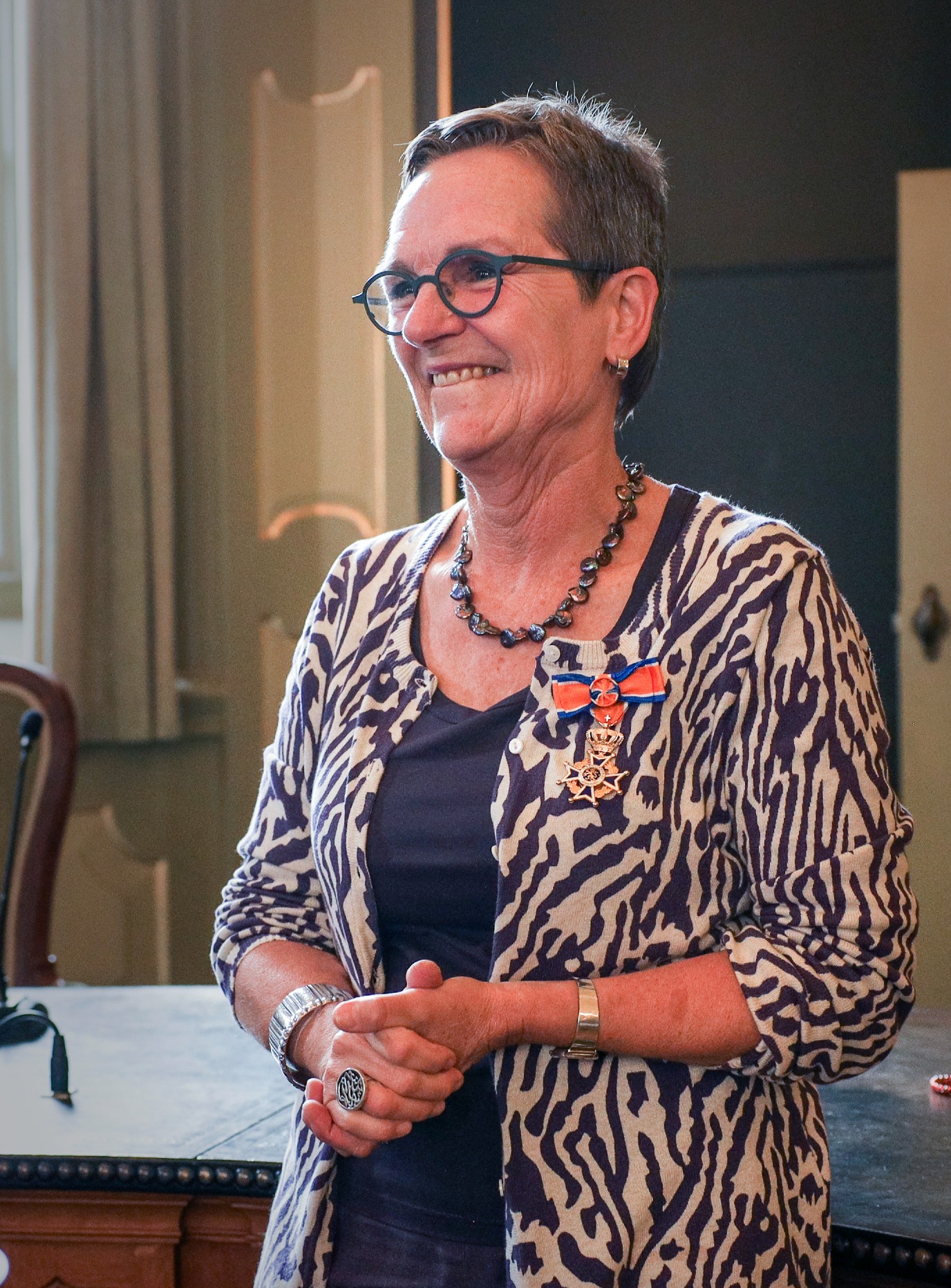Marjo Buitelaar receives Royal Decoration during farewell symposium
During the farewell symposium on the occasion of her retirement, held on Friday 17 October 2025, Marjo Buitelaar (Vlaardingen, 1958), Professor of Contemporary Islam at the Faculty of Religion, Culture and Society, received a Royal Decoration. She received the insignia belonging to the Royal Decoration in the category of Officer of the Order of Orange-Nassau from Mayor Hans Broekhuizen of the Municipality of Het Hogeland.

Exceptional and deeply appreciated. Enthusiastic, committed, and driven. A brilliant researcher who did a fantastic job of raising the profile of her field, both in the academic world and among a wider audience. This is how colleagues describe Marjo Buitelaar, a pioneer throughout her long career, known for her influential research into the role of Islam in everyday life. Her widely read and impressive academic oeuvre has had a significant impact. At international conferences, she inspired students and academics in various fields from all over the world to collaborate across disciplines and engage in dialogue. According to a Canadian colleague, this was a dazzling achievement. In an admirable way, she managed to remain critical and nuanced in a debate that has become increasingly polarized.
Focus on everyday life
After studying cultural anthropology at Radboud University in Nijmegen, where she graduated with a thesis on Moroccan bathhouses, Buitelaar obtained her PhD in 1991 with a study on Ramadan. She then joined the University of Groningen, where she was one of the first researchers to describe religion and ritual in Morocco from the perspective of daily life, community, and home. She conducted ethnographic research into concepts of cleanliness in bathhouses and the meaning of fasting and Ramadan. She consistently emphasized the daily lives of women, successfully revealing complex and often overlooked experiences.

Highly educated women
Buitelaar has conducted extensive research into how Muslims in Europe develop their identity in a post-migration context. She analysed how highly educated women in the Netherlands combine the values of their Moroccan background with the demands and values of their Dutch environment. By focusing on successful women, she emphasized these women’s own capacity for action and highlighted the richesse of multiculturalism rather than the “multicultural deficit” that often arises in social debates.
The experience of religion and identity
In 2014, she undertook the project Mecca: more magical than Disneyland, supported by a grant from the Dutch Research Council (NWO). It focused on the role of the pilgrimage to Mecca in shaping the way Dutch and Moroccan Muslims experience their religion and identity. Her book Narrating the Pilgrimage to Mecca is one of the first anthropological studies of the pilgrimage to Mecca. It is innovative in its approach due to its emphasis on everyday life. For example, she has integrated popular culture into her research and discusses the role of mobile phones during the pilgrimage.
Nuance in a polarizing world
Thanks to her social engagement, Buitelaar has had a major impact on both her field and society. In doing so, she has made the general public aware of the daily lives of their fellow Moroccans, both here in the Netherlands and in Morocco. Her commitment to making her insights accessible is evident from the many activities she has developed for the general public. Through lectures throughout the country, opinion columns, workshops, exhibitions, and appearances on radio and television, she has brought nuance to the debate on integration and Islam. To prevent knowledge, scholarly agendas, and debates from narrowing down to seeing Islam as a problem, she has always sought to collaborate with scholars from other disciplines. She continued to apply this approach consistently, even after 9/11, when the discourse on Islam in the Netherlands became increasingly polarized.
Gifted lecturer and committed supervisor
Buitelaar is known as a particularly gifted lecturer, with several teaching awards to her name. She guided students and junior researchers with dedication, combining her sharp and detailed feedback with a coaching-oriented approach. PhD students could count on both smiley faces and ‘boos’ in the margins as prompts to improve their work. She frequently took talented academics under her wing when they applied for prestigious grants. Newcomers to the faculty were always welcome in her home, and she enjoyed showing foreign students and colleagues around Groningen. She always refers to the hospitable family with whom she lived during her field research in Morocco as her ‘Moroccan family’.
Enthusiastic and driven
Marjo Buitelaar is enthusiastic and driven, and has always done more than could be expected as far as her work is concerned. She has a superb ability to describe the role of Islam in the daily lives of Muslims in a vivid and colourful way — she once wanted to attend the academy of performing arts, which shows in her way of presenting. She has a unique ability to help people identify with others, whether through lectures for women’s associations in Friesland or workshops for police diversity task forces. She firmly believes in the relevance of her field, contemporary Islam, to society. Through her research, but certainly also in her public appearances, she works to dismantle prejudice and discrimination against Muslims.
More news
-
06 January 2026
Connecting with history
